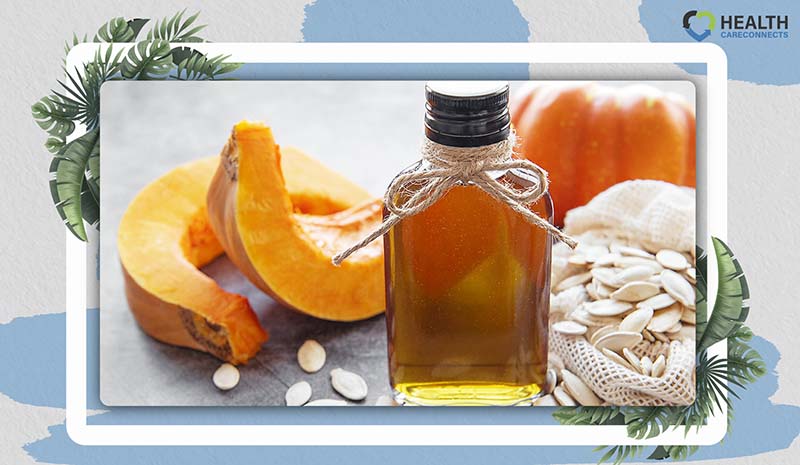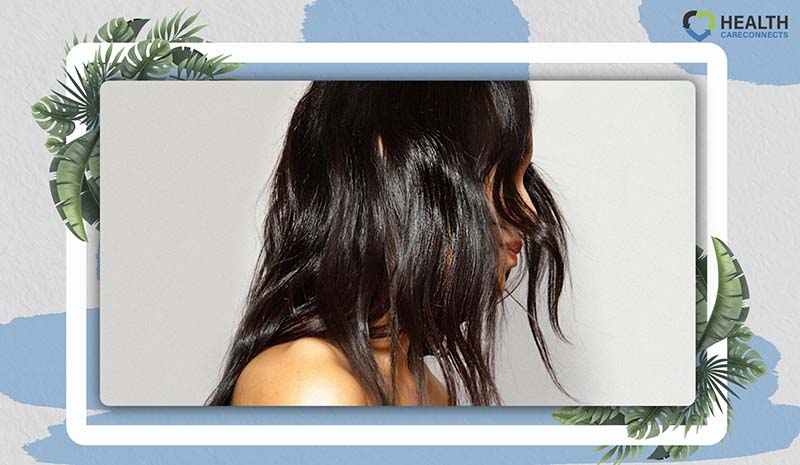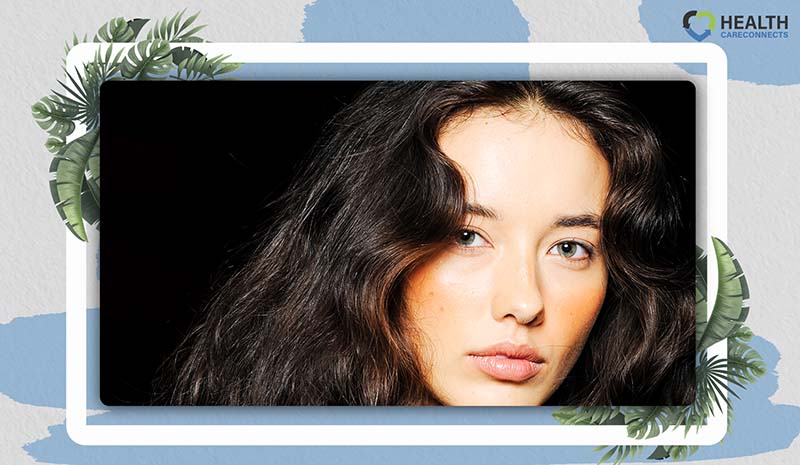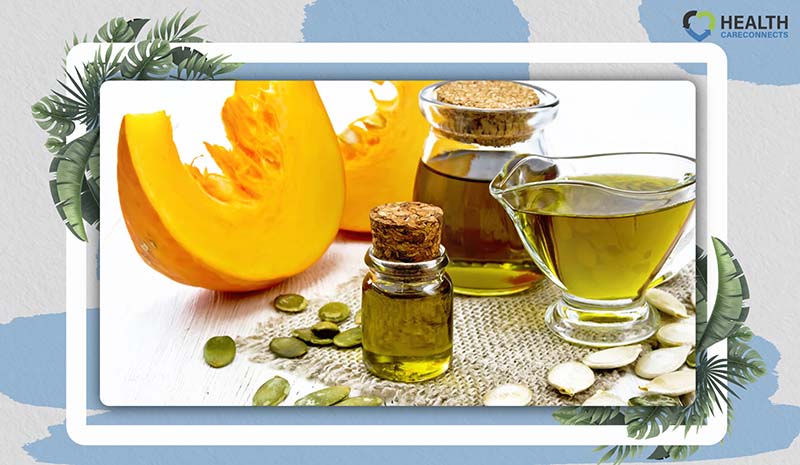Pumpkin is not only celebrated for its essential role in fall festivities like jack-o-lanterns and pumpkin pie but also for its broader benefits.
Is pumpkin oil good for hair? Indeed, it is. Pumpkin seed oil, a hidden gem derived from pumpkin seeds, boasts numerous advantages for skin and hair care. Is pumpkin oil good for hair?
Explore further to understand why incorporating this oil into your beauty regimen can be transformative.
Is Pumpkin Oil Good for Hair?
Pumpkin seed oil is regarded as a beneficial treatment for hair growth, particularly for hormonal hair loss, such as male or female pattern hair loss.
A study from 2021 found that pumpkin seed oil could be comparable to minoxidil foam, a popular hair loss treatment, in addressing female pattern hair loss.
Additionally, older studies have suggested that taking pumpkin seed oil orally may help improve hair growth in men with alopecia.

Advantages Of Pumpkin Seed Oil For Hair
Pumpkin seed oil is increasingly being integrated into haircare routines by those seeking to preserve their healthy hair. This natural oil offers a variety of benefits for your tresses.
Functions as a Hair Color Mask
Pumpkin seed oil has the unique ability to enhance and even subtly alter hair colors. Whether it’s reviving the vibrancy of existing shades or enriching newly grown, yet-to-be-colored hair, the pigment properties of this oil can make a noticeable difference. It works by treating the hair, which can accentuate specific tones or soften others.
Additionally, the rich nutrients in pumpkin seed oil strengthen the hair, enabling dyes to penetrate more deeply and last longer. For best results, ensure that you use 100 percent pumpkin seed oil without any additives, especially when applying it to colored hair. This practice guarantees both the efficacy of the oil and the safety of your hair color.

Improves Hair Shine
Pumpkin seed oil enhances hair shine due to its high linoleic acid content, an omega-6 fatty acid that contributes to hair health.
Increasing linoleic acid in your hair can also improve hair strength.
Provides Moisture to Hair
Pumpkin seed oil, with a similar melting point to coconut oil (liquid at around 76°F/25°C), is excellent for moisturizing dry hair.
However, use it sparingly to avoid making your hair oily. Try using half a teaspoon of pumpkin seed oil to treat a small portion of dry hair.
Repairs Hair Damage
The anti-inflammatory fatty acids in pumpkin seed oil, such as oleic acid, linoleic acid, and linolenic acid, help repair hair damage.
Zinc, also found in the oil, has anti-inflammatory properties that aid in treating hair damage.

Contains Hair Coloring Properties
Pumpkin seed oil can color hair due to its range of vitamins, minerals, and antioxidants that combat oxidative damage, which causes color changes in hair.
Lutein, the most common pigment in pumpkin seeds, colors hair and enhances its color by swelling with moisture. The unique amber hue of pumpkin seed oil offers a distinctive tonal color.
Increases Hair Strength
The vitamins, minerals, and antioxidants in pumpkin seed oil strengthen hair. Just two tablespoons of pumpkin seed kernels provide about 1.2 milligrams of biotin, a B vitamin that strengthens hair and nails and fights fungal infections.
Pumpkin seed oil is also rich in antioxidants like manganese, zinc, and tryptophan, which combat free radicals that can cause cellular damage, leading to hair loss and color change.
Can You Leave Pumpkin Seed Oil in Your Hair Overnight?
Yes, leaving pumpkin seed oil in your hair overnight can be highly beneficial. This extended period allows the oil ample time to deeply penetrate the scalp and hair strands, enhancing its effectiveness. However, applying oil to your hair before bed can be somewhat messy.
To avoid greasy sheets, simply apply the oil from the roots to the tips of your hair, and then cover your hair with a shower cap or bonnet. This not only keeps your bedding clean but also traps heat around your scalp, further aiding the oil in penetrating more effectively.
Who Benefits from Pumpkin Seed Oil Usage?
Most studies exploring the benefits of pumpkin seed oil have primarily included male participants, making it slightly challenging to draw definitive conclusions about its effectiveness for women.
However, any man suffering from hair loss can benefit from taking pumpkin seed oil. Early studies into female pattern hair loss suggest that women may also benefit from incorporating this ingredient into their routine.
A very small percentage of people using pumpkin seed oil might experience side effects such as sexual or ejaculation dysfunction. Additionally, those using pumpkin seed oil topically might experience scalp irritation.
When Pumpkin Seed Oil Stimulates Hair Growth
The effectiveness of pumpkin seed oil for hair growth varies depending on several factors, such as an individual’s hair type and condition, the quality of the oil, and the frequency of use.
While there is no one-size-fits-all answer, many people have reported seeing positive results after consistently using pumpkin seed oil for several months.

How to Apply Pumpkin Seed Oil
There are several ways to use pumpkin seed oil as a natural remedy for hair restoration:
Pumpkin Seed Oil Supplements
Pumpkin seed oil is often available in oil gel capsules. Typically, the recommended dosage is one 1000 mg capsule taken orally, one to two times, following meals three times per day.
However, because supplements are not regulated by the FDA, quality and dosage can vary. It’s crucial to purchase these supplements from reputable companies.
If you experience any symptoms of a food allergy or stomach upset, stop taking the supplements and consult with your healthcare provider.
Pure Pumpkin Seed Oil
You can also consume pure pumpkin seed oil directly. The usual intake is between 1 teaspoon and 1 tablespoon, taken three times per day. While some pumpkin seed oils are marketed specifically for health benefits, it’s important to follow label instructions carefully.
Remember, like supplements, these oils are not FDA-regulated, so sourcing from trustworthy companies is essential. Pumpkin seed oil is also available for culinary purposes, similar to olive oil, but it may not be as rich in phytonutrients due to the processing methods.
Additionally, pumpkin seed oil has a low smoke point, making it unsuitable for high-heat cooking.

Topical Application
For topical use, pumpkin seed oil can be applied directly to the scalp. One effective method is a hot oil hair treatment, ideally done once a week or month to prevent excessive oiliness. To prepare a pumpkin seed hot oil treatment, you can follow these steps:
- Shampoo your hair normally and avoid using any hair products afterward.
- Gently warm pumpkin seed oil using a double boiler. Test the oil on your wrist to ensure it’s not too hot.
- Wet your hair and massage the warm oil into your scalp. The oil should feel warm but not hot.
- After application, wrap your hair and head in a hot towel and leave it on for at least 20 minutes.
- Remove the towel, then shampoo, condition, and style your hair as usual.
How Pumpkin Seed Oil Fights Hair Loss
Pumpkin seed oil is loaded with essential nutrients such as zinc, magnesium, and omega-3 fatty acids, all of which are crucial for maintaining healthy hair. Zinc plays a key role in keeping the scalp healthy and fostering hair growth. Magnesium contributes to strengthening the hair shaft and preventing breakage. Meanwhile, omega-3 fatty acids are vital for nourishing both the scalp and hair follicles, which helps promote further hair growth.
Additionally, pumpkin seed oil has proven to be effective in reducing hair loss. This benefit is largely due to an active component in the oil called cucurbitin. Research indicates that cucurbitin inhibits the enzyme 5-alpha-reductase. This enzyme is responsible for converting testosterone into dihydrotestosterone (DHT), a hormone linked to hair loss. By impeding the activity of 5-alpha-reductase, pumpkin seed oil helps to prevent hair loss, making it a valuable addition to hair care routines.
Conclusion
Is pumpkin seed oil good for hair? While further research is necessary to fully confirm its benefits, pumpkin seed oil is generally recognized as a safe and natural treatment option.
It might take a few weeks to notice any results. If you experience any allergic reactions like redness or itching at the site of application, discontinue use of pumpkin seed oil immediately.
For more insights on maintaining healthy hair and overall wellness, explore our other blogs on Health Connect.

Dr. Joyce Slater: Your Guide to Informed Health Choices
Dr. Joyce Slater shines as a distinguished expert in the field of nutrition and public health. Contributing her vast expertise to HealthConnectbc, she embodies a deep-seated passion for enhancing public well-being. As a respected figure in her field. Dr. Slater’s academic journey and professional achievements are nothing short of inspirational.
Holding a significant position as a researcher and educator, Dr. Slater has delved deeply into the intricacies of food literacy and nutritional science. Her work, prominently featured in numerous esteemed scientific publications, underscores her dedication to expanding our understanding of food’s role in health and society.
At the heart of Dr. Slater’s professional ethos is a profound desire to positively impact individual lives through education and research. She often says, “Empowering people with the knowledge to make healthier choices is the most rewarding aspect of my work.” This principle is the cornerstone of her involvement with HealthConnectbc, where she strives to provide reliable and practical health advice.
Dr. Slater’s contributions to HealthConnectbc are multifaceted: academically, she offers insights into the complex world of nutrition and health, enhancing both public understanding and professional practices. Additionally, she is instrumental in guiding and inspiring the next generation of health professionals, thus fostering future excellence in the field.
Juggling rigorous research with her educational duties, Dr. Slater demonstrates an unwavering commitment to her profession. Her approachable nature and genuine concern transcend the confines of academia, touching the lives of everyone she interacts with. Dr. Slater looks forward to continuing her journey of discovery and education, dedicated to the ongoing improvement of public health and nutrition.
At HealthConnectbc, Dr. J. Slater is not just a contributor; she is a guiding light, dedicated to enlightening and motivating individuals towards a healthier and more informed lifestyle.
PUBLISHED ARTICLES
- Food literacy competencies: A conceptual framework for youth transitioning to adulthood (2018)
- Self-perceived eating habits and food skills of Canadians (2016)
- Challenges to acquiring and utilizing food literacy: Perceptions of young Canadian adults (2016)
- Socio-demographic and geographic analysis of overweight and obesity in Canadian adults (2009)
- Sustainable well-being: Concepts, issues, and educational practices (2014)

